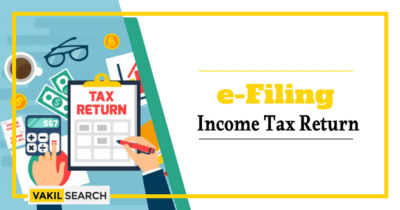As technology has progressed, the overall tax filing concept has found a new dimension. With ITR filing online, paying tax has become a hassle-free process; it offers fast refunds to taxpayers. There is no problem related to paper documentation. As a result, there is less chance of error notices from the tax department.
Every day, as there is constant progress in science and technology, many changes are brought in the field of ITR e-filing. Online ITR e-filing is hassle-free, and it allows for getting faster refunds. ITR e-filing online can be done on an individual basis. You can also contact some of the reputed agencies in India that will brief you about the draft and the overall filing and tax benefit processes. You can simply register your name on the tax e-filing website, upload all major KYC documents for verification and then go on paying your taxes on a timely basis. In India, the online income tax e-filing process was introduced in September 2004 for all the eligible categories of people for income tax e-filing. And after that, from the year 2006 onward, the government made it mandatory for all corporate firms to file their income tax online mode. In addition, from 2013 onwards, all those individuals who have more than ten lakhs income should mandatorily do the e-filing of their income tax online. Another important point here is that, as per the government tax regulations in India, anyone whose yearly income is more than five lakhs is liable to pay the e-filing online. Also, if individuals want a tax rebate under sections 90, 90A, or 91, they shall go for ITR e-filing online.
- How you go for the online e-filing of income tax is an online, self-prepared return, and for this, you only need a computer or a laptop, a high-speed broadband connection, and the software that helps you prepare the tax file.
- ITR e-filing online also includes submitting ITR using a chartered accountant or a tax professional’s personal computer and tax-filing software system.
- The whole system is highly beneficial as Digital signatures have a scope. A proper electronic verification code is sent to the receiver, who finds no problem filing the tax properly.
- October 31 remains the due date of the assessment year if it is about tax e-filing for a firm or company that requires an account audit to be done registered under the Income Tax Return.
Smart tax planning made simple. Use our Income Tax Calculator for accurate projections.
What Are the Features, Advantages, and Growth of ITR Online Filing?
ITR e-filing online has some of major benefits that can be enumerated:
- It does not include any complicated paperwork system and is an entirely online process that allows for many benefits to the holders.
- It always gives you better returns, the process is faster, and you do not have to pay any hidden fee or any extra charge.
- You get the quick and unhindered delivery of information. The process of e-filing through the tax website is easy; you gather all information from there and then start e-filing the tax or knowing about the slabs as well.
- ITR e-filing online leaves no room for the tax department to claim any type of mistake or manual error on your part. There is also nothing called a data entry error, as everything is system-generated.
- There is no paper handling or manual documentation required, and hence, the process of tax e-filing becomes easier. This means that there is a very less operating cost.
- The whole system is accessible all day and week, and you can simply finish your office time and then sit and pay the tax online. You can take help from the online instruction manuals or even talk to their customer care executives.
The Evolution of ITR E_Filing Over the Last Ten Years
ITR filing online has already seen stupendous growth from the time of its inception. However, problems do arise, especially in those areas with less or no internet speed, and people find it difficult to go for online tax filing if they are residents of remote areas. Sometimes, people also have a certain lack of awareness, and they are skeptical or afraid about doing tax filing online. They fear that important data might get lost, and there can be ways in which they might suffer from insufficient funds to set up an online tax filing system. There are certain observations that have been noticed in the trend of the last few years for online tax filing:
Compared to 2007-2008 and 2013-2014, there is a huge growth of 9.60% in the rate of e-tax filing. And this is the reason why technology and automation system have been a boon for the tax department. This is much different from what people used to do during manual filing, and hence, this process has become popular among many people. The e-filing of the tax reduces overall tension and gives one the facility to move ahead to get the best returns. There is no loss of energy, and the TRPs for online tax filing also create better job prospects for many people.
For all the residents of India, there is a system of e-filing. One of the provisions also points out that a person who is a resident and has any signing authority in any account outside India can also go for the e-filing and online tax returns.
Conclusion:
It is important to find out the steps and the guidelines for ITR filing online: https://www.incometax.gov.in/iec/foportal/. It is easy if you open an account all by yourself, but if you want, you can also take help from some of the tax-filing companies. Find out what applies to individual public firms, private and public limited companies, and what rules govern tax filing online. There are also rules related to the presumptive businesses of a person, and the tax rules can vary in that case accordingly. Moreover, you should always check the last year’s tax returns, TDS, bank statements, balance sheets and audit reports if you are the single or joint owner of a firm. You must contact some trained and experienced tax professionals in this regard.
Read More:
- What is the TDS limit under Income Tax Act
- Income Tax Depreciation Rates for Annual Year 2021-22
- How to pay TDS for Interest on Fixed Deposit?
- How to download Income Tax Assessment Form?
- What is STCG on Shares in IT Retuns?
- Choose your own Tax rate using Form 10-IB
- Amount deductible under the Income Tax Act
- Updates in new offline ITR utility
- Income Tax Act : 269ST
- Different types of ITR










